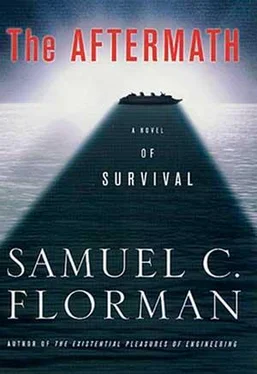According to my specifications, Jim Head devised a “safe zone” that sliced through the southeast shore of South Africa, providing Richards Bay as a beachhead, and KwaZulu Natal as a center of action. By happenstance, the zone also included the southern portion of Madagascar. This gave me, as a bonus setting, that incredibly exotic island. Incidentally, the quote about the population of Madagascar being “the most astonishing fact of human geography in the entire world,” comes from Guns, Germs, and Steel: The Fates of Human Societies by Jared Diamond.
Although the geographical setting and the catastrophe scenario were my biggest research challenges, I received other assistance that needs to be mentioned.
Rich Combes provided helpful information about industrial development in Colonial North America, and details about the numbers of people required to perform specific items of work. He also read the manuscript and shared his imaginative ideas. Nora Jason, Manager of Fire Research Information Services at the National Institute of Standards and Technology, directed me to valuable material about fire storms. Other useful facts came from Captain Enrico Ferri of Renaissance Cruises, David Pang of the American Association of Pharmaceutical Scientists, Leon Shargel of the National Association of Pharmaceutical Manufacturers, and Aristotle Tympas.
I particularly appreciate Henry Petroski taking time from his own very busy writing and teaching schedule to read portions of the manuscript and make helpful comments.
It was pleasant, as well as convenient, to be able to do some of the writing in my office at Kreisler Borg Florman Construction Company. The people there were helpful in a variety of ways, particularly Virginia Crowley, who has been our corporate secretary and my invaluable assistant for many years.
Many friends and colleagues were generous with advice and suggestions. Those whose names I have written down in connection with particular references and correspondence are Wilson Binger, Alvin Converse, Ruth Greenstein, Lois and Jerry Lowenstein, M. Granger Morgan, Greg Pearson, Allan and Craig Rubin, and Anthony Viscusi. I thank them all, as well as the many others who, in passing, volunteered helpful ideas.
There came a time when (reluctantly) I declared the research complete, and started to write. Tom Dunne, who has been my editor, publisher, and good friend for twenty-five years, gave counsel and support—and then tactfully urged me to work on a second draft, and a third. Tom’s assistants, Emily Hopkins and Carin Siegfried, were cheerful and efficient coordinators of the many things that go on in a publisher’s office.
However, it wasn’t until Greg Tobin arrived on the scene that the “work in progress” developed into its final form. Greg resolved my difficulties with structure, and rescued me from narrative impasses. His contribution came first in the form of creative ideas, and later as words that I was happy to employ. His help was invaluable; and his consistent good cheer and unfailing faith in the project pro vided a sweet coating for his most radical critiques.
Finally, my wife, Judy, deserves a very big thank you. She spent many long hours working with the manuscript, from my earliest efforts on, and the prose is much crisper and cleaner than it would have been without her suggestions.
A number of people with whom I have discussed this work, and a few who read portions of the manuscript, think that, however gloomy its recipe for disaster, its view of human behavior is wildly optimistic. Worldwide catastrophe, so they say, would inevitably be followed by an era of chaos, discord, and brutality. Clearly I don’t share that pessimism.
Perhaps it is my five granddaughters, to whom the book is dedicated, who have given me this faith in the future.
THOMAS DUNNE BOOKS.
An imprint of St. Martin's Press. T heaftermath: a novel of survival. Copyright © 2001 by Samuel C. Florman.
All rights reserved. Printed in the United States of America.
No part of this book may be used or reproduced in any manner whatsoever without written permission except in the case of brief quotations embodied in critical articles or reviews.
For information, address St. Martin's Press, 175 Fifth Avenue, New York, N.Y. 10010. www.stmartins.com
Design by Victoria Kuskowski
LIBRARY OF CONGRESS CATALOGING-IN-PUBLICATION DATA
Florman, Samuel C.
The aftermath:a novel of survival / Samuel C. Florman.—1st ed. p. cm.
ISBN 0-312-26652-9
1. Comets—Collisions with Earth—Fiction. 2. Survival after airplane accidents, shipwrecks, etc.—Fiction. 3. Natal (South Africa)—Fiction. 4. Engineers—Fiction.
1. Title.
PS3606.1.6H A69 2001 813.54—dc21
First Edition: December 2001
2001041969
10 4876 5 4321
Samuel C. Florman is a civil engineer and principal in a major New York-area construction company. In addition to having written scores of articles, Mr. Florman is the author of The Introspective Engineer , The Civilized Engineer, Blaming Technology , and his classic, The Existential Pleasures of Engineering . He lives in New York City.












